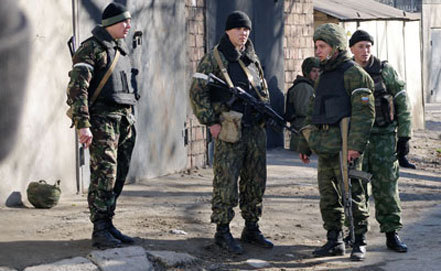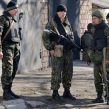
As Sochi Approaches, Ethnic Russians Continue to Leave the North Caucasus
Publication: Eurasia Daily Monitor Volume: 10 Issue: 182
By:

With the Olympics in Sochi scheduled to start on February 7, 2014, the situation in the North Caucasus is not improving as quickly as the authorities in the Kremlin would like (https://www.sochi2014.com/). The steps the Russian government has taken so far appear to be insufficient for any substantial improvement, so the authorities are increasingly resorting to the use of propaganda statements as the opening of the Games draws closer.
On October 1, Alexander Bortnikov, director of the Federal Security Service (FSB) and chairman of the Russian National Antiterrorist Committee (NAK), chaired the 44th meeting of the Federal Operational Headquarters in Moscow. A week later, on October 8, Bortnikov addressed the 42nd meeting of the NAK. Reporting on the situation in the North Caucasus from January to September of this year, Bortnikov stated that the number of terrorist-related acts had been reduced by half (https://www.itar-tass.com/c96/905169.html). Bortnikov expressed confidence that the infrastructure of the terrorist underground had suffered significant losses. He did not try to conceal the fact that the primary focus of the agency’s work has been on the security situation in the North Caucasus and Southern federal districts. Speaking of the decrease in the number of terrorist attacks in comparison to 2012, Bortnikov noted that most of the terrorist acts occurred in Dagestan—120 out of a total of 144.
The intensity of the official meetings this month indicates that the government is concentrating all of its efforts on improving the security in the area around Sochi (https://nac.gov.ru/nakmessage/2013/10/08/8-oktyabrya-2013-goda-provedeno-42-e-zasedanie-natsionalnogo-antiterro-ristich.html). The security services have held 15 exercises in the past year, seven of which took place around the site of the Olympic Games next February.
The territory nearest to Sochi that is profoundly affected by insurgency-related violence is the North Caucasus republic of Kabardino-Balkaria (KBR). The total number of victims of violence, including the dead and injured, in the republic during 2012 was only 156, the fourth highest toll among the North Caucasian republics (https://www.kavkaz-uzel.ru/articles/225256/). But the authorities in Kabardino-Balkaria are more worried about the armed opposition’s increasing recruitment of young people (https://kavpolit.com/rasul-kudaev-pisma-iz-zindana-pochemu-molodezh-uxodit-v-les/?print). Against the backdrop of these processes, the Russian population of the republic feels insecure. Given the experience of Chechnya and Ingushetia, which became practically mono-ethnic, and Dagestan, which is gradually losing its own ethnic-Russian population, Russians realize that it is safer for them to leave the region before massive violence breaks out. The outflow of ethnic Russians from KBR already seems to be irreversible. For example, in 1989, ethnic Russians comprised almost 32 percent of the total population of Kabardino-Balkaria (https://demoscope.ru/weekly/ssp/rus_nac_89.php?reg=47). However, the census of 2002 showed that Russians comprised only 25 percent of the republican population. Eight years later, the census of 2010 showed that the percentage of Russians had further declined by another three percent, dropping to 22 percent.
A report by the Center for Conservative Research of Moscow State University’s Department of Sociology paints an unsightly picture of the authorities’ denial of the fact that the Russian population is being pushed out of the republics of the North Caucasus (https://skfonews.info/article/172?utm_source=twitterfeed&utm_medium=twitter). An anonymous reporter for the Russian news agency Interfax says that it does not publish information about the outflow of ethnic Russians from the North Caucasus because the regional authorities object to such reporting, saying it fuels nationalism.
It is therefore not surprising that ethnic Russians in Kabardino-Balkaria regard the spread of Wahhabism (a.k.a. Salafism) as one of the most worrying trends. According to the Medium Orient information agency, the number of respondents who consider the proliferation of Wahhabism one of the greatest security threats in the republic grew almost tenfold in the period 2005–2012, from 6 percent to 59 percent. People are most worried by the rapid rise of Islamic radicalism and the spike in violence (https://svpressa.ru/society/article/73379/).
These findings contradict the official explanation for the outflow of Russians from the republic. The regional authorities normally point to the scarcity of jobs as the cause of the outflow (https://smartnews.ru/regions/sevkav/11129.html). The authorities say that Kabardins and Balkars are also leaving the republic. However, even when Kabardins and Balkars leave KBR, they can always come back. They do not normally sell their land, houses and apartments. Ethnic Russians leave for good, selling their homes and land, so they have few opportunities to return. The regional authorities’ attempts to portray the positions of the local ethnic groups and the ethnic Russians as equal do not hold up. If unemployment was the only problem for the ethnic Russians, they would simply leave temporarily as the locals do and then come back home. More and more ethnic-Russian areas of KBR are left with retired people who have nowhere to go since their children have not yet settled elsewhere.
Russians leave not because of economic problems, but because of safety concerns. Thus all kinds of programs aimed at encouraging Russians to return to the North Caucasus are unrealistic (https://voprosik.net/prava-russkix-na-severnom-kavkaze/)—the outflow of Russians must first be stopped. Planning to move furniture into a burning house is impractical. No benefits or promises that everything will simply be fine will convince the Russian population to return to a place they literally ran away from (https://skfonews.info/article/163).
The outflow of the ethnic-Russian population from Kabardino-Balkaria is a vivid signal to all of the northwestern Caucasus and a sign of the fluidity of the growing situation in the region. One thing is sure, the current demographic trends, such as the statistics for KBR, indicate that there will be fewer Russians living in the North Caucasus than when Putin won the bid for the 2014 Sochi Olympics.
The processes in Kabardino-Balkaria look increasingly like those that previously took place in the northeastern Caucasus—Chechnya, Ingushetia and Dagestan. This means there is no reason to believe that the trends in Kabardino-Balkaria will be reversed and that the Islamic groups will reduce their activities (https://www.mirvboge.ru/2013/05/bez-zapreta-vaxxabizma-problemu-islamizacii-rossii-reshit-ne-udastsya/).
Against the backdrop of the natural increase of the role of Islam in the lives of Kabardins and Balkars, there will be more conflicts between religious people and those who adhere more to national traditions. The authorities themselves are unwittingly promoting the rise of Islam in the society. Thus, in spite of government reassurances, the increase in tensions in Kabardino-Balkarian society is unlikely to be reversed.




